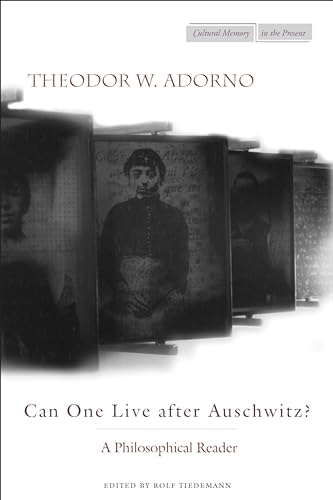Can One Live After Auschwitz?
A Philosophical Reader
Theodor Adorno
BOOK REVIEW

The chilling question "Can One Live After Auschwitz?" reverberates not just through the pages of Theodor Adorno's philosophical anthology, but through the very fabric of our understanding of human existence and moral responsibility. This profound reader collates a series of essays and reflections that grapple with the haunting implications of the Holocaust and its aftermath, a dark chapter in history that demands not only remembrance but intellectual confrontation.
Adorno, a leading figure of the Frankfurt School, does not shy away from the abyss. Instead, he pulls you into it, inviting you to think critically about the nature of suffering, memory, and the potential for redemption after enduring incomprehensible tragedy. His philosophical approach melds existential angst with a relentless critique of society, compelling you to reflect on whether true life is possible in the shadow of such horror. The narratives he crafts are layered and complex, allowing you moments to catch your breath, even as they thrust you deeper into the metaphysical mire of loss.
Reading Can One Live After Auschwitz? is akin to standing on the precipice of an emotional and intellectual chasm. You feel the weight of history on your shoulders, the ghosts of those lost souls urging you to question the very foundations of civilization. Adorno's prose can be dense, even labyrinthine at times, but it mirrors the struggle of grappling with weighty ethical dilemmas. This is no light reading - it's a journey through pain, reflection, and ultimately, a quest for meaning.
The essays within explore the dichotomy of existence both before and after Auschwitz, challenging readers to confront their own complicity in historical atrocities, however indirect. Adorno asks: how can one rebuild a sense of humanity when the fabric of humanity itself has been so violently torn? His thoughts find resonance in contemporary discourses on trauma and memory, making this work endure beyond its original historical context into our current age of political and social upheaval. This book dares you to ponder the deep scars left on the collective conscience - can we truly move forward without addressing these past horrors?
Readers often find themselves polarized by Adorno's take; some herald him as a prophetic voice that echoes the necessity of confronting uncomfortable truths, while others grapple with his cynicism. "How can life retain meaning in the face of such darkness?" many wonder. The sentiments expressed in this collection evoke not just an intellectual response but stir profound emotions - anguish, rage, and, occasionally, hope. These contrasting feelings underscore the ongoing impact of the Holocaust and the various interpretations of how it informs the lived experience.
Critics have often pointed out Adorno's pessimism, questioning whether such a bleak outlook on post-Auschwitz life offers genuine insight or simply deepens despair. Yet, this very tension between despair and resilience is what drives the book's urgency. It compels you to confront awkward truths about empathy, society, and the potential for collective healing. Adorno doesn't spoon-feed answers; instead, he asks you to wrestle with the questions - unsettling as they are.
Several readers echo sentiments about the disruptive nature of this book, emphasizing that it's not merely an academic exercise but a call to action. "It forced me to face the ghosts of the past," one reader remarked, indicating how Adorno's work transcends time, resonating with contemporary discussions around human rights and social justice. The book becomes an emotional catalyst, generating discussions that ripple outward, compelling you to engage with history in a way that is personal and immediate.
In a world plagued by repeating cycles of hatred and violence, Can One Live After Auschwitz? remains a stark reminder of our moral obligation to remember and learn. Adorno lays bare the complexities of suffering and resilience, insisting that acknowledging the past is not a choice but a necessity. This philosophical reader transcends its historical context, forcing you to question your own role in the tapestry of humanity - are you a mere spectator or a participant in the ongoing narrative of existence?
Delve into Adorno's world and allow yourself to be challenged, provoked, and perhaps even transformed. The urgency of his message is palpable, serving as both a warning and an invitation to engage more deeply with the structures of power and morality in your own life. Can one live after Auschwitz? After wrestling with this question, one might find that living well requires not just survival, but an active commitment to remembering and learning from the past. This book beckons - will you answer?
📖 Can One Live After Auschwitz?: A Philosophical Reader
✍ by Theodor Adorno
🧾 559 pages
2003
#live #after #auschwitz #philosophical #reader #theodor #adorno #TheodorAdorno